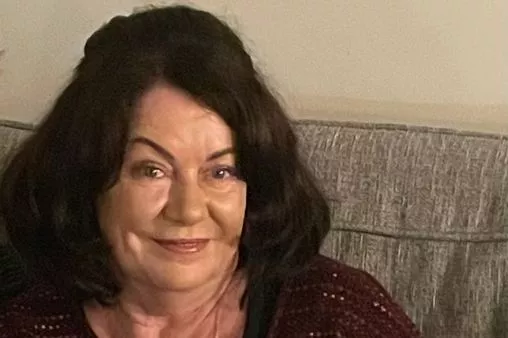Health
Dublin Mother Urges Awareness of Ovarian Cancer Symptoms

Deirdre Fennelly, a mother of three from Dublin, was diagnosed with stage 4 ovarian cancer in 2021 after experiencing what she initially thought were unrelated health issues. Her journey began with persistent bloating, which she later learned was a significant symptom of ovarian cancer. Fennelly is now advocating for greater awareness of the disease, emphasizing that cervical screenings do not detect ovarian cancer.
For several months, Fennelly dealt with severe bloating, leading her to believe she was simply gaining weight. “I joined WeightWatchers, thinking I was just overeating,” she recalled. She also struggled with recurrent urinary tract infections, visiting her doctor multiple times without connecting these symptoms to her cancer diagnosis.
“Realistically, I think my body was desperately trying to tell me something was seriously wrong, but I didn’t listen,” she said. She later visited her general practitioner due to chest congestion, which was wrongly attributed to inflamed lymph nodes. “Even if I had put all the pieces together, I wouldn’t have known it was ovarian cancer,” she added.
Fennelly’s journey took a serious turn when she experienced excruciating pain on her side, initially believing it to be kidney stones. After a lengthy wait in the emergency room, she returned the next day due to persistent pain. “I was scanned and told that I had a tumour on my left ovary,” she said. Following a biopsy, doctors confirmed she had early stage 4 ovarian cancer, with a survival rate of just 25%.
The impact of the diagnosis was profound. “I couldn’t understand how my life had turned against me,” she expressed, recalling her feelings of despair, especially as her husband was in the process of building their dream home. “I was fighting for my life,” she said, describing her emotional turmoil during treatment.
Fennelly underwent an intensive treatment regimen over two years, which included nine weekly chemotherapy sessions and a nine-hour surgery to remove affected organs. “They took whatever they could get their hands on, even my appendix,” she stated. She also received a HIPEC (Hyperthermic Intraperitoneal Chemotherapy) treatment during surgery, aimed at eliminating remaining cancer cells.
Despite the difficult journey, Fennelly celebrates being in remission for two years, though she continues to undergo scans every six months. “I would have thought that a stage 4 diagnosis was the end of the road, but apparently not,” she said.
Her experience has driven her to raise awareness about ovarian cancer, highlighting the lack of detection methods. “There is no detection test for ovarian cancer,” she emphasized, noting that many women mistakenly believe their cervical screenings provide comprehensive checks for all gynecological cancers.
According to the Health Service Executive (HSE), symptoms of ovarian cancer include persistent bloating, a swollen abdomen, and discomfort in the pelvic area. “I hadn’t a clue,” Fennelly admitted. “I thought I was covered by having my cervical screening every year.”
Fennelly’s story underscores the importance of understanding the symptoms of ovarian cancer and the limitations of current screening programs. She urges women to pay attention to their bodies and seek medical advice if they experience any concerning symptoms.
As her advocacy continues, Fennelly hopes that increased awareness will lead to earlier diagnosis and better treatment options for women facing ovarian cancer.
-

 Top Stories3 months ago
Top Stories3 months agoTributes Surge for 9-Year-Old Leon Briody After Cancer Battle
-

 Entertainment4 months ago
Entertainment4 months agoAimee Osbourne Joins Family for Emotional Tribute to Ozzy
-

 Politics4 months ago
Politics4 months agoDanny Healy-Rae Considers Complaint After Altercation with Garda
-

 Top Stories4 months ago
Top Stories4 months agoIreland Enjoys Summer Heat as Hurricane Erin Approaches Atlantic
-

 World5 months ago
World5 months agoHawaii Commemorates 80 Years Since Hiroshima Bombing with Ceremony
-

 Top Stories3 months ago
Top Stories3 months agoNewcastle West Woman Patricia Foley Found Safe After Urgent Search
-

 Top Stories5 months ago
Top Stories5 months agoFianna Fáil TDs Urgently Consider Maire Geoghegan-Quinn for Presidency
-

 World5 months ago
World5 months agoCouple Convicted of Murdering Two-Year-Old Grandson in Wales
-

 World5 months ago
World5 months agoGaza Aid Distribution Tragedy: 20 Killed Amid Ongoing Violence
-

 World5 months ago
World5 months agoAristocrat Constance Marten and Partner Convicted of Infant Murder
-

 Top Stories4 months ago
Top Stories4 months agoClimbing Errigal: A Must-Do Summer Adventure in Donegal
-

 Top Stories4 months ago
Top Stories4 months agoHike Donegal’s Errigal Mountain NOW for Unforgettable Summer Views









